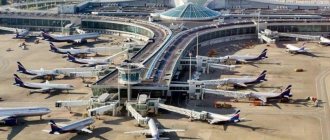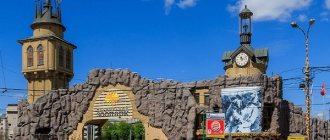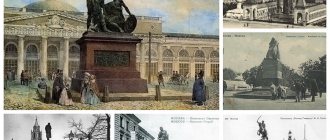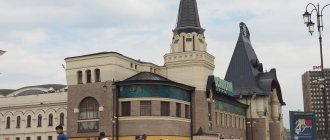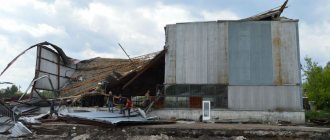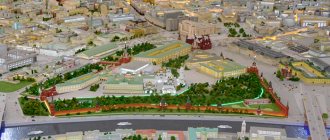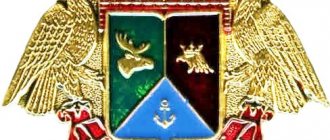| The government of Moscow | |
| abbreviated as City Hall | |
| Coat of arms of the city of Moscow | |
| general information | |
| A country |
|
| Jurisdiction | Moscow |
| date of creation | June 24, 1991 |
| Predecessors | Moscow City Executive Committee Moscow City Government |
| Management | |
| Subordinated | mayor of Moscow |
| Mayor of Moscow | Sergei Sobyanin |
| Device | |
| Headquarters | Moscow, Moscow City Hall building, Tverskaya street, building 13 55°45′40″ s. w. 37°36′32″ E. d.HGЯOL |
| Website | mos.ru |
| Media files on Wikimedia Commons | |
The Moscow Government building (City Hall), is located at the address: Tverskaya street, house No. 13, view from the opposite side of Tverskaya street. Complex of buildings of the Moscow Government, at the address: Novy Arbat street, house No. 36, former CMEA building.
The government of Moscow
(
mayor's office
) is a government body that heads the system of executive authorities of the city of Moscow, which includes sectoral and functional executive authorities (departments, committees, main departments, directorates and inspections) that carry out executive and administrative functions in certain sectors and areas of city government , as well as territorial executive authorities for local management - these are prefectures of administrative districts and district governments.
The government is headed by the mayor. Members of the Moscow government also include its deputies, the head of the Office of the Mayor and the Moscow Government, ministers of the Moscow Government and prefects of the administrative districts of the city of Moscow with the rank of ministers of the Moscow Government.
Content
- 1 History
- 2 Executive authorities of the city of Moscow 2.1 Mayor of Moscow
- 2.2 Moscow government
- 2.3 Office of the Mayor and Government of Moscow
- 2.4 Urban services complex
- 2.5 Complex of regional security and information policy
- 2.6 Complex of transport and road transport infrastructure
- 2.7 Social development complex
- 2.8 Complex of economic policy and property and land relations
- 2.9 Complex of urban planning policy and construction
- 2.10 Territorial executive authorities
- 2.11 Elections in Moscow at all levels
- 3.1 Presented diagram [ what?
]
- 4.1 Awards of the city of Moscow
Construction of a new Moscow government building
Construction began in September 2005. It was deployed on the territory of the business district under the leadership of the former mayor of Moscow Yuri Luzhkov. According to him, a complex will be built consisting of 4 buildings of 70 floors each. Departments of the legislative and executive authorities of Moscow will be located there. Moreover, construction must be carried out in a short time. Budget funds will not be required to carry out the work. Construction is planned to be carried out on the basis of collateral.
History of origin[ | ]
In the Russian Empire, until 1918, the executive body of city government was the Moscow City Council under the leadership of the mayor.
In Soviet times, the executive body was the executive committee of the Moscow City Council, which actually carried out the decisions of the city party committee.
In 1991, even before the collapse of the USSR, for the first time in the RSFSR, a mayor and government were elected in Moscow, which served as the beginning of the creation of a new system of city executive authorities[1]. At first, the Moscow Government and the Moscow City Executive Committee existed in parallel, until in September 1991 the latter was finally abolished. Initially, the positions of the city mayor and the prime minister were separated. After the resignation of Gabriel Popov, they were combined for a long time by Yuri Luzhkov. On August 20, 2001, the position of prime minister was officially abolished, and the mayor began to head the government.[2]
Modernity
In 1993, the Moscow City Council was abolished, and the building on Tverskaya was converted into the residence of the mayor of Moscow[19][20]. In 1994, portraits of the capital's governors-general were returned from museum storage to the state rooms of the house. At the same time, the Soviet symbols that decorated the pediment of the house were replaced with the coat of arms of Moscow[1][2].
Since 2002, the City Hall building has been participating in the “Days of Historical and Cultural Heritage of Moscow” program. The first tour of the former residence of the governor generals for schoolchildren was conducted by the mayor of the city, Yuri Luzhkov. Traditionally, weddings of Muscovites are held within the walls of the house on Krasnaya Gorka[21]. Rallies and single pickets were repeatedly held near the building in order to attract public attention[22][23][24].
In 2013, a large-scale reconstruction of the architectural decoration of the house took place, funds for which were allocated from the city budget. During the work, decorative elements of the facade, wrought iron fences and balcony grilles were repaired, the roofing was partially renewed, drainpipes were replaced, and expansion joints in places of vertical cracks were eliminated[25][26][27].
Executive authorities of the city of Moscow[ | ]
In 2021, the Moscow Government purchased 55,000 m² in the Oko tower for offices[3]
Mayor of Moscow[ | ]
The highest official of the city of Moscow is the Mayor of Moscow, elected in general elections for a term of 5 years.[4] Directly reporting to the Mayor of Moscow are the Department of Finance of the City of Moscow, the Main Control Department of the City of Moscow, the Press Service of the Mayor and the Government of Moscow, the Office of the Mayor and the Government of Moscow, as well as the Association of Administrative and Technical Inspections of the City of Moscow.[5]
Moscow Government[ | ]
The highest permanent collegial body of executive power of the city of Moscow is the Moscow Government, which ensures coordination of the activities of other executive bodies. The government is headed by the Mayor of Moscow.[4]
The Moscow Government includes the Mayor of Moscow, Deputy Mayors of Moscow in the Moscow Government, ministers of the Moscow Government, who are appointed and dismissed by the mayor.[4]
Deputy mayors and government ministers lead and coordinate the work of other executive authorities, united in City Management Complexes created to coordinate the activities and improve the structure of executive authorities of the city of Moscow.[6]
Office of the Mayor and Government of Moscow[ | ]
- Information Technology Department
- Department of Territorial Executive Authorities
- Department of Trade and Services
- Department of Cultural Heritage[7]
- Department of Culture
- Department of Entrepreneurship and Innovative Development
- Tourism Committee
- Committee of Public Relations and Youth Policy
- Management of the Mayor and Government of Moscow
Urban services complex[ | ]
- Department of Housing and Communal Services (DHCS)
- Capital Repair Department
- Department of Civil Defense, Emergency Situations and Fire Safety
- Department of Natural Resources and Environmental Protection
- State Housing Inspectorate
Complex of regional security and information policy[ | ]
- Department of Regional Security and Anti-Corruption[8]
- Sports Department[9]
- Department of Media and Advertising
- Department of National Policy and Interregional Relations[10]
- Department of External Economic and International Relations
- Department for ensuring the activities of justices of the peace
Complex of transport and road transport infrastructure[ | ]
- Department of Transport and Road Transport Infrastructure Development
- Moscow Administrative Road Inspectorate
Social development complex[ | ]
- Department of Health
- Department of Education and Science
- Department of Labor and Social Protection[11]
- State Services Committee
- Veterinary Committee
- Main Archives Department
- Office of Civil Registry
- State Inspectorate for the Quality of Agricultural Products, Raw Materials and Food
Complex of economic policy and property and land relations[ | ]
- Department of Economic Policy and Development (DEPR)
- City Property Department (DGI)
- Competition Policy Department (Tender Committee)
- Department of Investment and Industrial Policy
- State Inspectorate for Control over the Use of Moscow Real Estate
Complex of urban planning policy and construction[ | ]
- Department of Urban Development Policy
- Construction Department
- New Territories Development Department
- State Construction Supervision Committee
- Committee on Architecture and Urban Planning (Moscomarchitecture)
- Committee for ensuring the implementation of investment projects in construction and control in the field of shared construction (Moskomstroyinvest)
- Committee on pricing policy in construction and state examination of projects
Territorial executive authorities[ | ]
- Prefectures of administrative districts[12]
- District governments[12]
Elections in Moscow at all levels[ | ]
Since 2021, the First Deputy Mayor in the Moscow Government, Chief of Staff Natalya Sergunina, is responsible for internal policy, including the organization of elections in Moscow at all levels [13][14][15]. In this post, she replaced the mayor’s long-time ally, Anastasia Rakova, and before that she worked at the Federal Agency for State Property Management and Moscow authorities on property and land relations[13].
Criticism[ | ]
Frequent road repairs
In 2021, it turned out that 130 streets in Moscow have undergone renovations two or more times over the past four years. Moreover, according to documents of the Moscow Government, asphalt replacement on large roads should be no more than once every three years, on small streets - once every 4-5 years[16].
Financial situation of Natalia Sergunina
On August 1, FBK published an investigation in which it accused the Moscow mayor’s office and the deputy head of the city, Natalya Sergunina, personally of corruption in the amount of 6.5 billion rubles (the video received more than 2.5 million views on the YouTube video hosting site). According to the official declaration, she is one of the poorest city hall officials[17]. At the same time, FBK claims that Sergunina’s real fortune is estimated at 6.5 billion rubles, and while being responsible for the sale of city real estate at auction, she underestimated the value of the objects that passed into the hands of her family, sister and her ex-husband. According to the authors of the investigation, the enrichment scheme is “almost an ideal crime,” since it was carefully thought out, and “an amazing combination of circumstances helped to solve it”[18][19].
Cinema "October"
The presented diagram[of what?][ | ]
| This section may contain original research. Add links to sources, otherwise it may be deleted. More information may be on the talk page. |
Moscow owns a large number of different historical buildings and cultural heritage sites. In some cases, it is more profitable to sell them than to maintain them [ source not specified 324 days
].
And it is precisely such objects that can be found in specialized magazines for potential buyers. In the investigation, the Anti-Corruption Foundation also used such magazines, but not to buy mansions, but to find illegally taken real estate. The June 2021 issue was reviewed (later the July issue). It acquires 3 real estate objects with disproportionate value (the price of real estate in all locations is many times higher than the objects acquired by Mercury). Moreover, the difference between the asking price and the purchase itself was the same in all 3 cases - 466,150 rubles. The reason for this could not be understood. Interestingly, this scheme uses a whole chain of offshore companies. Thus, Mercury LLC is owned by a company from Cyprus - Florestar, and it, in turn, is owned by two more offshore companies from the British Virgin Islands - Upington International Limited (UIL) and Candee. In parallel with this, FBK employees determined that the husband of Natalya Sergunina’s sister, Lazar Safaniev, owns a British [ what?
] by Balkan Consalding (this follows an extract from the English register of legal entities). In addition, it was possible to find out that Lazar is the beneficiary (owner) of Upington International Limited. This means that he is the owner of the very objects purchased at auction from the capital. In addition to UIL, Candee was also investigated. Using it, we were able to discover 2 more objects (“Bronnaya Plaza” and a building in Zamoskvorechye). Also, as a result of the investigation, the owner of the Moscow cinema "October" was identified. As a result, direct damage from violations during the privatization of Moscow property alone is estimated at 1,043 billion rubles. Neither the City Hall nor Sergunina commented on this matter[20].
Regnatsky's financial situation
In 2021, the mother of the head of the Moscow regional security department, Vladimir Vladimirovich Regnatsky, who is responsible for coordinating rallies and processions in Moscow, was found to have an apartment worth about 200 million rubles, which until 2011 belonged to V. V. Regnatsky himself.[21][22] [23][24]
Gorbenko's financial situation
In 2021, it became known that Rosreestr changed the name of Moscow Vice-Mayor Alexander Gorbenko, who deals with regional security and information policy issues in the Moscow Government, in documents for a suburban plot in Bityagovo near Moscow with an area of 2 hectares. Now in the extract the owner of the land is listed as a certain Ivan Ivanovich Fedorov, however, the date of purchase of the land and the registration number of the transaction coincide with the previous ones, when Gorbenko owned it. In addition, the neighboring plots are still registered in the name of the son and wife of the vice mayor. On 2 hectares of land owned by Gorbenko, there are nine houses, two ponds, three sports and playgrounds, five statues and one “dachshund” bench. FBK assessed the property at the vice-mayor's dacha at 500 million rubles[25][26][27][28][29].
Awards of the city of Moscow, approved by the Moscow Government[ | ]
Main article: Moscow Awards
The Moscow government has established a number of awards, honorary titles and prizes for the city of Moscow[30].
Awards of the city of Moscow[ | ]
| Honorary titles of the city of Moscow[ | ]
| Moscow City Awards[ | ]
|
Notes[ | ]
- Agafonkin, Demid Borisovich.
Dissertation on the topic “The system of legislative and executive authorities in the city of Moscow.”
Abstract on the specialty VAK 12.00.02 - constitutional law, municipal law (Russian). dissercat.com
. — Scientific electronic library of dissertations and abstracts. Date accessed: August 27, 2021. - Luzhkov is no longer prime minister, he is simply our mayor. Moscow Mayor Yuri Luzhkov, by his decree, changed the structure of the government of the capital (Russian). “Komsomolskaya Pravda”
(August 30, 2001). Date accessed: August 27, 2021. - Ekaterina Gerashchenko.
"Eye" for the mayor's office.
Moscow government officials are moving to Moscow City (Russian). "Kommersant"
(July 27, 2016).
— The article was published in the Kommersant newspaper No. 134 dated July 27, 2016, p. 7
. Date accessed: August 27, 2021. - ↑ 1 2 3
Charter of the city of Moscow (Russian).
Moscow City Duma
. Date accessed: February 20, 2021. - Moscow authorities: complete list of departments and committees (Russian). Official website of the Moscow Mayor
. Date accessed: August 27, 2021. - Moscow government in person / Moscow website (unspecified)
.
web.archive.org
(July 12, 2020). Date accessed: February 20, 2021. - Department of Cultural Heritage of the City of Moscow (Russian). Official website of the Moscow Mayor
. Date accessed: August 27, 2021. - Department of Regional Security and Anti-Corruption of the City of Moscow (Russian). Official website of the Moscow Mayor
. Date accessed: August 27, 2021. - Department of Sports of the City of Moscow (Russian). Official website of the Moscow Mayor
. Date accessed: August 27, 2021. - Department of National Policy and Interregional Relations of the City of Moscow (Russian). Official website of the Moscow Mayor
. Date accessed: August 27, 2021. - Department of Labor and Social Protection of the Population of Moscow (Russian). Official website of the Moscow Mayor
. Date accessed: August 27, 2021. - ↑ 1 2
Territorial authorities (Russian).
Official website of the Moscow Mayor
. Date accessed: August 27, 2021. - ↑ 1 2
Sergunina Natalya Alekseevna.
Authorities (Russian). Official website of the Moscow Mayor
. Date accessed: August 27, 2021. - Elena Mukhametshina, Bela Lyauw.
The Kremlin will monitor the elections of Moscow City Duma deputies.
The new internal political bloc of the mayor's office closely interacts with the presidential administration (Russian). Vedomosti
(February 4, 2019). Date accessed: August 27, 2021. - Andrey Pertsev.
The townspeople are angry again.
Why did the authorities provoke a crisis around the elections to the Moscow City Duma (Russian). Carnegie Moscow Center
(July 22, 2019). Date accessed: August 27, 2021. - The Moscow mayor's office explained the frequent repairs of roads (unspecified)
. RBC. Date accessed: August 21, 2021. - The income of Moscow officials for 2021 has been published (Russian). BFM.ru
(April 13, 2019).
— “ Another deputy mayor, head of the apparatus of the mayor and government of Moscow, Natalya Sergunina, as in 2021, earned less than her colleagues in 2021 - 7.2 million rubles.
" Date accessed: August 27, 2021. - FBK found property worth 6.5 billion rubles (Russian) from the family of Sobyanin’s deputy, who oversees the elections. TV channel "Rain"
(August 1, 2019). Date accessed: August 27, 2021. - FBK found real estate worth 6.5 billion rubles (Russian) from the family of the vice-mayor of Moscow. "Kommersant" (August 1, 2019). Access date: August 12, 2021.
- Georgy Alburov.
Sobyanin’s deputy stole billions from Muscovites (Russian).
FBK
(August 1, 2019). Date accessed: August 27, 2021. - FBK claims that it discovered an apartment worth 200 million rubles (Russian) owned by the head of the Moscow regional security department. Echo of Moscow. Date accessed: August 22, 2021.
- FBK found an apartment for 200 million rubles (Russian) from the head of the Moscow regional security department. TV channel "Rain" (August 22, 2019). Date accessed: August 22, 2021.
- FBK found an apartment for 200 million rubles from the mother of the capital official responsible for coordinating rallies (Russian). "New Newspaper". Date accessed: August 22, 2021.
- FBK found an apartment for 200 million rubles (Russian) from the head of the Moscow Anti-Corruption Department. "Mediazone". Date accessed: August 22, 2021.
- Olga Morozova.
FBK: Moscow Deputy Mayor Alexander Gorbenko's dacha near Moscow was classified for 500 million rubles (Russian). "Snob". Date accessed: August 27, 2021. - FBK: Rosreestr renamed the vice-mayor of Moscow Gorbenko in the statement about the owner of a dacha in the Moscow region (Russian). TV channel "Rain" (August 27, 2019). Date accessed: August 26, 2021.
- FBK: Deputy Mayor of Moscow Alexander Gorbenko has classified a dacha near Moscow with an area of two hectares (unspecified)
. Meduza (August 27, 2019). Date accessed: August 26, 2021. - FBK: Rosreestr renamed the vice-mayor of Moscow Alexander Gorbenko in the statement for a house worth 500 million rubles (Russian). "Mediazone". Date accessed: August 26, 2021.
- Alexey Navalny.
Blogs / Alexey Navalny: The secret dacha of the one who beats you (Russian). "Echo of Moscow". Date accessed: August 26, 2021. - Awards, honorary titles and prizes of the city of Moscow (Russian). Official website of the Moscow Mayor // mos.ru. Date accessed: August 27, 2019.
- Moscow City Prize in the field of journalism (Russian). Official website of the Moscow Mayor
. Date accessed: August 27, 2021. - Moscow City Award “Legend of the Century” (Russian). Official website of the Moscow Mayor
. Date accessed: August 27, 2021. - Moscow City Prize in the field of literature and art (Russian). Official website of the Moscow Mayor
. Date accessed: August 27, 2021. - Prize of the city of Moscow in the field of medicine (Russian). Official website of the Moscow Mayor
. Date accessed: August 27, 2021. - Prize of the city of Moscow in the field of education (Russian). Official website of the Moscow Mayor
. Date accessed: August 27, 2021. - Prize of the city of Moscow in the field of physical culture, sports and tourism (Russian). Official website of the Moscow Mayor
. Date accessed: August 27, 2021. - Moscow City Security Award (Russian). Official website of the Moscow Mayor
. Date accessed: August 27, 2021.
When was the order restored?
Governor-General Zakhary Chernyshev brought stability to the residence of Moscow mayors when he took office in 1782. It is believed that the palace on Tverskaya, 13 ➍ was built specifically for him. Matvey Kazakov, worked on the project . True, Chernyshev himself was destined to remain in office for a short time. In 1784 he died, and the palace was bought by the treasury. For more than a century, the building on Tverskaya was the main residence of all governors-general, until 1917. During the Soviet era, the Moscow City Council was located in the governor’s house, and since the 1990s, the Moscow City Hall.



